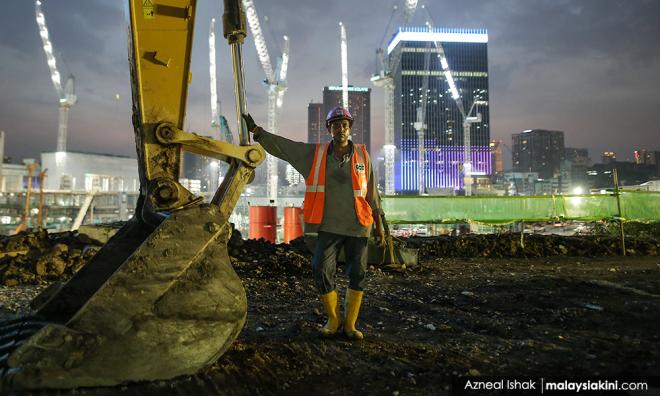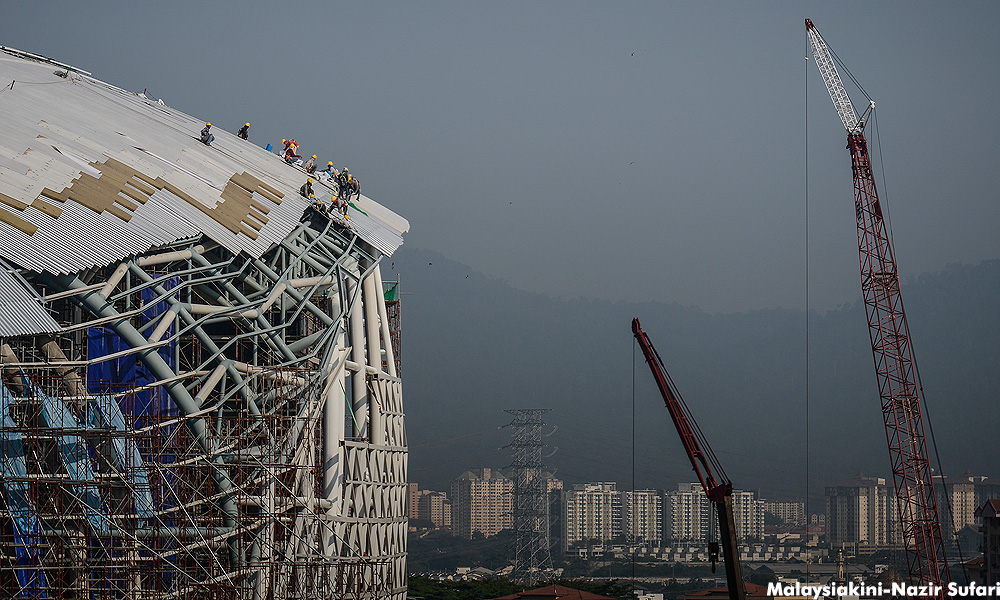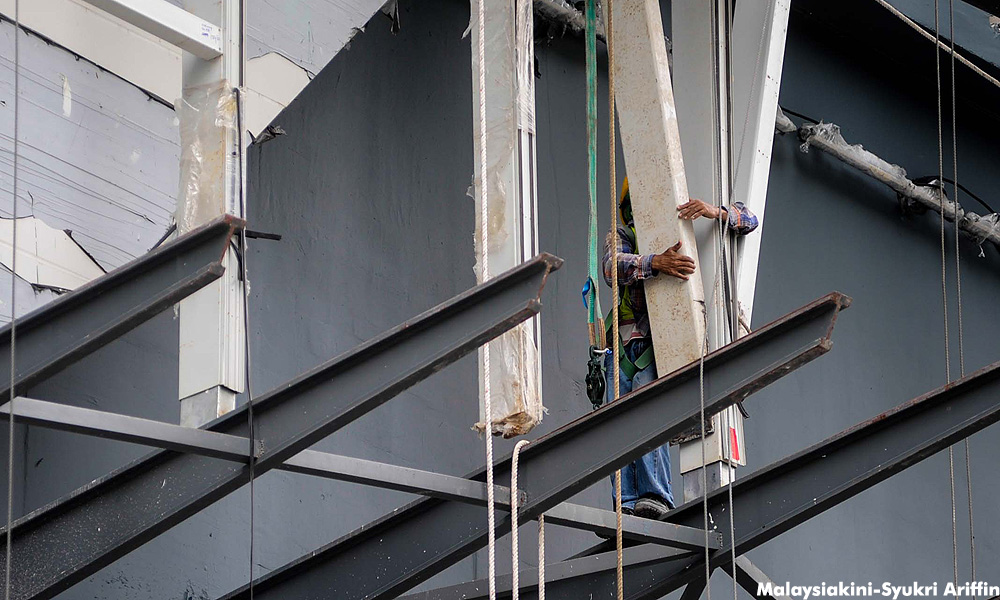Our opioid dependence on cheap foreign labour

As a nation, our reliance on foreign workers in the construction industry has become an opioid crisis that does not seem to go away.
The industry keeps complaining about the labour shortage on the one hand but little effort has been made to address the low productivity growth. Based on a study by Khazanah in 2017, the level of labour productivity for the manufacturing sector in Malaysia increased by almost three-and-a-half-fold between 1985 to 2016.
However, the labour productivity of the construction sector during the same corresponding period only increased by 0.5 times, with productivity even decreasing in 2005. What are the causes of this abysmal situation? One of the main contributory factors is the continuing demand for cheap labour and the shortage of unskilled labour in the country.
In addition, successive governments responses to labour policy in an ad hoc way, often flip-flopping on decisions rather than committing themselves to formulating a comprehensive policy on labour migration has led to a total of five million undocumented foreign workers in the country.
In the past two months, the country has witnessed a series of outbreaks of Covid-19 in several urban areas. Although details are sketchy it is likely that most of the cases involve foreign workers and in the case of an Ampang condominium project, some foreign workers escaped and ran away. Most likely they were undocumented.
It is a known fact that the enforcement of proper housing for foreign workers is weak and most of them live in overcrowded and unhygienic accommodations which has led to the spread of the Covid-19 virus among the foreign worker population.

The additional complication of a large undocumented foreign worker population can only compound the problem further. The economic cost of the latest extension of the conditional movement control order amounting to billions of ringgit in lost production is partly the result of infections among documented and undocumented foreign workers.
Until and unless we deal with the excessive demand for the cheap foreign labour by the construction industry, this problem will continue. The Construction Industry Transformation Programme (CITP) for the years 2016 to 2020 identified the compelling case for change in adopting new technologies and best practices in enhancing the productivity of the construction industry. The report further identified the Industrialised Building System (IBS) and the utilisation of Building Information Modelling (BIM) as the key levers in achieving this objective.
In August 2017, the Master Builders Association highlighted the sluggish progress in revising the uniform building by-laws as one of the main reasons for the lack of progress in achieving the 50 percent target by 2018 for IBS adoption and 100 percent by 2020. The 2018 CIDB annual report states that 81 percent of all government projects adopted IBS. However, there is no mention to what level and to what extent productivity was enhanced.
Interestingly, the report remains silent on the achievement for private sector projects. As for the implementation of BIM in projects at Level 2; my own experience is that it remains very low to non-existent and mainly confined to the mega-projects like the Klang Valley MRT project.

The private sector reluctance to implement IBS is mainly related to cost. IBS costs up to 20 percent more than conventional construction depending on whether the IBS components are cast on-site or from a centralised factory remote from the site and whether it is a partial IBS (50 percent) or full IBS (100 percent).
Developers and contractors will continue to design their buildings for conventional construction as it is cheaper to employ readily available undocumented foreign workers in conventional construction projects when compared to IBS method where factory environments require compliance to a legal workforce.
The hidden social costs then get transferred to society to carry while the developers and contractors benefit from the lower direct cost of employing these undocumented foreign workers who have overstayed in the country when their work permits expired. Contractors are also reluctant to undertake IBS projects as there are initial costs to set up the IBS factory and the carrying cost of precast components that are not paid until installed on site. The negative cash flows are a deterrent given that the current contract payment structure does not support the IBS method of construction.
The current approach of setting labour quotas and levy structures to regulate supply has also not been successful. The government’s constant changing of the quota requirements has caused significant dislocation in the foreign worker market and has had the unintended consequence of causing labour to abscond from their employers and become undocumented labour. Workers who have just acquired their skills after four years do not get their passes renewed. Instead, new unskilled workers are recruited.
Vested interests in the value chain prefer to recruit new workers due to the potential financial gain accrued through the commissions that are paid by these new workers to the agents that then get filtered down into the system.

Successive governments have failed to curb these commission-based recruitment methods and it appears to be ingrained into our system. This is an ongoing issue that needs to be resolved at the policy level of the Human Resources Ministry the Home Affairs Ministry and the Construction Industry Development Board (CIDB).
Change building by-laws
The foreign worker problem, I believe, should be also tackled at the demand side by reducing the demand for cheap foreign labour by amending the uniform building by-laws in Kuala Lumpur, Selangor, Penang and Johor to mandate the 50 percent IBS with immediate effect and 100 percent in three years time. This will reduce the demand for foreign workers by at least 40 percent based on a study undertaken by CIDB.
The stumbling block in achieving the uniform building by-laws amendment is, I believe, objections by developers and contractors who still believe that IBS is more expensive and requires upfront funding. There is thus a need for CIDB and the Ministry of Works to get on an engagement drive with all the contractors' associations and local authorities to promote and set up training facilities to train the market to adopt IBS.
Additionally the Institute of Surveyors should revise the conditions of contract and payment methods specifically for IBS contracts to address the negative cashflow concerns. I would recommend that CIDB do away with all the other lesser KPIs contained in their current 2020 review and only concentrate on getting the IBS and BIM into the uniform by-laws. The construction industry would achieve a massive productivity boost in one go and this would enhance the national GDP.
The benefits of IBS, according to a study by the Construction Research Institute of Malaysia, are 35 percent faster construction, 40 percent less labour, 8 percent less waste, better quality and finally better safety. This Covid-19 pandemic has put into sharp focus the need for the industry to finally shake out of its opioid dependence on cheap foreign labour
PARAMESWARAN SIVALINGAM is an independent consultant with 40 years experience in the construction industry both locally and abroad. - Mkini
✍ Credit given to the original owner of this post : ☕ Malaysians Must Know the TRUTH
🌐 Hit This Link To Find Out More On Their Articles...🏄🏻♀️ Enjoy Surfing!



















Post a Comment